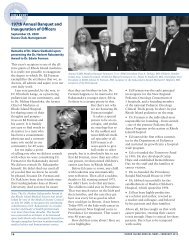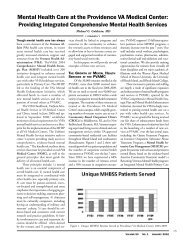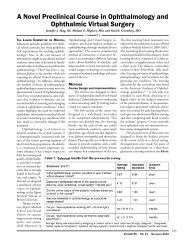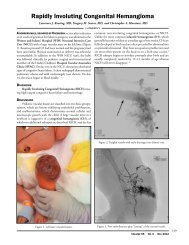Hyperuricemia & Gout - Rhode Island Medical Society
Hyperuricemia & Gout - Rhode Island Medical Society
Hyperuricemia & Gout - Rhode Island Medical Society
Create successful ePaper yourself
Turn your PDF publications into a flip-book with our unique Google optimized e-Paper software.
ADVANCES IN PHARMACOLOGY<br />
Use of Angiotensin-Converting Enzyme Inhibitors/Angiotensin<br />
Receptor Blockers and Lipid-lowering Therapies among <strong>Rhode</strong><br />
<strong>Island</strong>ers with Diabetes Enrolled in Medicare Part D Plans in<br />
2006 and 2007<br />
Stephen Kogut, PhD, MBA, RPh, Aisling Caffrey, PhD, and Lynn Pezzullo, RPh<br />
DISCLAIMER<br />
The analyses upon which this publication is based were performed<br />
under Contract HHSM-500-2006-RI, ‘‘Utilization<br />
and Quality Control Peer Review Organization for the State<br />
of <strong>Rhode</strong> <strong>Island</strong>,’’ sponsored by CMS, Department of Health<br />
and Human Services. The contents of this publication do not<br />
necessarily reflect the views or policies of the Department of<br />
Health and Human Services, nor does mention of trade names,<br />
commercial products, or organizations imply endorsement by<br />
the U.S. government. The authors assume full responsibility for<br />
the accuracy and completeness of the ideas presented. This article<br />
is a direct result of the Health Care Quality Improvement<br />
Program initiated by CMS, which has encouraged identification<br />
of quality improvement projects derived from analysis of<br />
patterns of care and therefore required no special funding on<br />
the part of this contractor. Feedback to the authors concerning<br />
the issues presented is welcomed.<br />
WITH THE INTRODUCTION OF MEDICARE PART D IN 2006, MEDICARE<br />
Quality Improvement Organizations (QIOs) were directed<br />
to collaborate with Medicare Part D prescription drug plan<br />
providers to improve the safety, efficiency and effectiveness of<br />
prescription drug use. 1 Quality Partners of <strong>Rhode</strong> <strong>Island</strong>, the<br />
Medicare-contracted QIO for <strong>Rhode</strong> <strong>Island</strong>, initiated an effort<br />
to improve the quality of medication use among that state’s<br />
Medicare beneficiaries with diabetes mellitus. Selecting diabetes<br />
presented a logical starting point, because epidemiologic<br />
studies have described the under-use of medications. 2-7 Additionally,<br />
patients with diabetes can be identified from pharmacy<br />
claims data with an acceptable level of specificity.<br />
This initiative sought to increase the use of lipid-lowering<br />
and angiotensin-directed drug therapies (i.e. angiotensin-converting<br />
enzyme inhibitors (ACEIs) and angiotensin receptor<br />
blockers (ARBs)), from the perspective of both prescribing and<br />
patient adherence. When this study was initiated, the American<br />
Diabetes Association (ADA) recommended that all senior<br />
patients with diabetes be treated with statin therapy to achieve<br />
cholesterol reduction, regardless of baseline LDL level. 8 The<br />
ADA also recommended that ACEI/ARB therapy be prescribed<br />
for patients having both diabetes and hypertension, a<br />
group which comprised “the majority of people with diabetes”.<br />
8 The ADA noted that “ACE inhibitors have been shown<br />
to improve cardiovascular outcomes in high–cardiovascular risk<br />
patients with or without hypertension.”<br />
Quality Partners collaborated with the University of <strong>Rhode</strong><br />
<strong>Island</strong> College of Pharmacy, provider groups, and several Medicare<br />
Part D drug plans in the state. The initiative included academic<br />
detailing by a clinical pharmacist, presentations at physician<br />
group meetings, dissemination of educational materials,<br />
and targeted letters presenting physician-level prescribing rates<br />
for ACEI/ARB and lipid-lowering therapies. The audience<br />
learned the utilization rates of ACEI/ARB and lipid-lowering<br />
therapies among Part D plan enrollees having diabetes, and<br />
the significant differences in the rates of use of these therapies<br />
among sub-groups. This report presents that data.<br />
METHODS<br />
We conducted cross-sectional analyses of dispensings of<br />
ACEI/ARB and lipid-lowering drugs for two 6-month periods:<br />
January 1 - June 30th, 2006; and January 1 - June 30th,<br />
2007. Pharmacy data were provided by several but not all<br />
Medicare Part D prescription drug plans operating in <strong>Rhode</strong><br />
<strong>Island</strong> during 2006 and 2007. The pharmacy data included<br />
patient age and gender; a prescriber identifier (DEA number);<br />
the drug name and quantity, and the date of dispensing. For<br />
2007, information describing gender was missing for approximately<br />
one-third of patients and was imputed based on the<br />
percentage of patients in the population for which gender was<br />
documented.<br />
Among patients receiving medications for diabetes, we<br />
determined the percentage of patients who were dispensed an<br />
ACEI/ARB and a lipid-lowering drug therapy at least once<br />
during a 6-month period. Lipid-lowering therapies included<br />
both statin and non-statin medications.<br />
We classified age as 50-64 years, 65-74 years, or 75 years of<br />
age or older. We hypothesized that medication utilization would<br />
be higher among patients with coronary artery disease, and we<br />
used the proxy of receiving a prescription for a nitrate-containing<br />
product to identify this comorbidity. We also sought to determine<br />
if ACEI/ARB and lipid-lowering therapy utilization rates<br />
were higher among patients receiving care from one of the physician<br />
group practices that were participating in this initiative,<br />
VOLUME 92 NO. 11 NOVEMBER 2009<br />
373
















